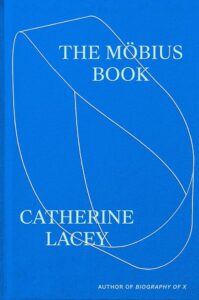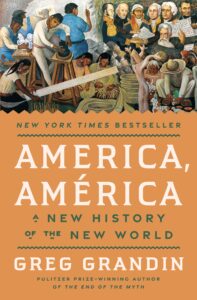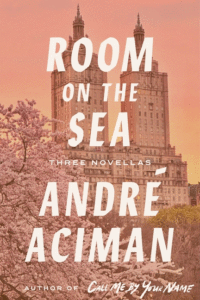Our grab bag of gorgeous reviews this week includes Robert Rubsam on Donald Niedekker’s Strange and Perfect Account From the Permafrost, Nina Allan on Catherine Lacey’s The Möbius Book, Carolina A. Miranda on Greg Grandin’s America, América, Crispin Long on André Aciman’s Room on the Sea, and Elvia Wilk on Marlen Haushofer’s Killing Stella.
Brought to you by Book Marks, Lit Hub’s home for book reviews.
*
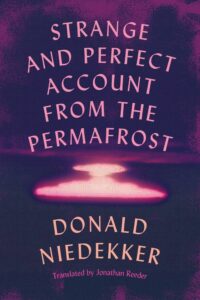
“Just remember that death, as Nick Cave sings, is not the end—not in this novel, at least. With his body preserved, the narrator’s consciousness is set free. Guided by a Samoyed shaman, he roams back to his childhood, expounds on his dislike of the ocean, tells of a polar bear who wintered many years by his side, and narrates the life of the preacher and cartographer Petrus Plancius, whose incorrect map led the poet and his crew to their deaths. In effect, he is presenting us with his memoirs from inside the grave.
This process is spiritual, yes, but also geologic. Centuries of history and incident have collected haphazardly atop our narrator’s frozen psyche, a process that allows ‘the sediments of memory to seep down to earlier times, mixing together the old with the new,’ and leads to a novel liberated from the negligible concerns of plotting, character and temporal linearity. Rather than the rational chronicle of a scientific explorer, Niedekker presents us with a mosaic, a series of jumbled-up anecdotes, reflections, jokes and visions that begin with the Age of Discovery and end deep in the Anthropocene, when the permafrost is thawing and ‘forever is not forever anymore.’
…
“Rather than the isolated individual of the modern novel, Niedekker is searching for a non-dualist perspective in which there is no real separation between the ‘one’ of the narrator and the ‘all’ of the world. His poet is both a long-dead Dutchman and a conduit for an array of individual and collective experiences, a fluid perspective that ranges widely without ever losing the chatty, chummy touch of its central voice.”
–Robert Rubsam on Donald Niedekker’s Strange and Perfect Account From the Permafrost (The Washington Post)
“Following her divorce and just before the publication of her groundbreaking novel Outline (2014), Rachel Cusk spoke of her break-up with traditional narrative fiction, commenting that ‘once you have suffered sufficiently, making up John and Jane and having them do things together seems utterly ridiculous.’ Lacey’s position seems less absolutist. The Möbius Book does not reject the idea of fiction so much as demonstrate how fiction and nonfiction are in constant dialogue, how each is never entirely what it says it is. Just as distorted echoes of the memoir can be found in the fictional half – the seeping blood from next door; the accidental drowning of the young couple—so the scenes that are ostensibly true must be fiction to an extent, the curated memories of a subjective narrator.
In one of the most arresting sequences in the autofictional section, the narrator visits a psychic in Mexico, Michal, who offers to rid her of ‘entities’ that are hindering her recovery. Lacey is not normally a believer in such esoteric practices, but she is determined to step out of her comfort zone, to apprehend the world from an alternative vantage point.
…
“On one level at least, the exorcism can be seen as a representation of the creative disjuncture that Catherine Lacey is exploring. ‘What I think I’m doing when I write a novel and what I later realize I’ve done is so out of sync that I’ve felt repeatedly shocked and sometimes embarrassed at how I’ve tricked myself once again,’ she insists. Her previous novels have similarly been acts of disruption—the interrogation of quotidian reality through the introduction of the dystopian or alien. The Möbius Book acts as a fracturing and reshaping of those previous realities—readers will note the significant deployment of a hammer and a crowbar in both sections. It is equally a moving documentary of personal loss, a meditation on the fragility of identity and a critique of the struggle women still face in being heard.”
–Nina Allan on Catherine Lacey’s The Möbius Book (Times Literary Supplement)
“Trump’s regime makes the arrival of the historian Greg Grandin’s ambitious new book, America, América: A New History of the New World, incredibly timely. His previous, Pulitzer-winning book, The End of the Myth, incisively explained how U.S. expansionism gave way to the border-wall isolationism of the Trump era. In America, América, he expands the frame. Over 768 pages, Grandin gives us the sweep of history: the bloodshed of colonization, the movements for independence, manifest destiny in the U.S. and caudillo rule in Latin America, a pair of world wars, the Cold War, and the growing polarization of the 21st century.
…
“Although such gory tales push the story along, what makes América, America instructive is Grandin’s focus on the way that Latin American thinkers have advocated for important social rights from the very foundation of their republics. For starters, many early independence movements in Latin America were linked to the abolition of slavery—most notably in Haiti. The South American liberation leader Simón Bolívar emancipated the slave laborers who worked on his family’s estate—unlike George Washington and Thomas Jefferson. Moreover, the constitutions of many Spanish-speaking republics went beyond enshrining individual rights, also offering protection to el bien común de la Sociedad (‘the common good of society’).
…
“Grandin’s narrative upends the idea of Latin America as perpetual victim, instead chronicling a tradition of leaders who have consistently fought for the social good. One particularly illuminating chapter traces the way that liberation theology, Marxist economic theory, and Latin American literature came together in the 1960s to articulate ‘the intangible ways patriarchs, dictators, landlords, and foreign capital maintained their rule.’ Grandin argues that this was ‘a period of such intense intellectual vitality, it should be considered equal to European Enlightenment.’”
–Carolina A. Miranda on Greg Grandin’s America, América: A New History of the New World (The Atlantic)
“Every novel is a kind of fantasy, but some serve different purposes than others. Aciman’s fictions, divorced as they are from a broader social context, are distinctly adolescent, enveloped in a warm fog of prettified angst and nostalgia. When the lovers of his realms encounter difficulties, they are mostly the alluring kind—I want something but am too tortured to pursue it; I got what I wanted and then had complicated feelings about it; the one I love won’t love me back. There are pairs of people whose romantic connections are unassailable; in Aciman’s universe, if you encounter your One True Mate, they will understand you perfectly and possess an uncanny authority on the nature of your inner life. If the two of you cannot be together, you will be haunted by the potency of this love until you exit this mortal coil. These are the sorts of fantasies that cultivate the delicate, fledgling egos of the inexperienced, giving them enough hope, whether about their good fortune or their capacity to aestheticize bad fortune, to continue into the uncertain future. For grown people, to dwell too long on such flights of fancy is suspect.
…
“Coasting on the success of Call Me by Your Name, Aciman seems content to loaf inside picturesque reveries of this sort. In the hands of a more interesting prose stylist, the meandering could work, but the sentences are as pancake-flat as the plots. (The less said the better about Mariana, the third novella in the collection, in which we enter the interminable stream of consciousness of a woman in unreciprocated love with a man she meets at an academy in guess which country.) Reading his recent fiction, one might feel duped in the way of the tourist who eats at a beachfront restaurant only to discover that, because the view is lovely and the foot traffic abundant, the food gets away with being nearly inedible.
…
“Aciman seems to believe that the fantasy of Italy, and of everything else, is better than the real thing. The sentiment is not wrong so much as it is incomplete. In fantasy, we exercise greater control than we do when our visions collide with the inconvenient fact of other people’s existence. But the dreamscape is an airless place, unfit for permanent residence. Sifting through Aciman’s enervating procession of gorgeous, sun-dappled days in Italy, I was reminded of the dull feeling one gets toward the end of a holiday, the antsy determination to get back into the action of the everyday. The quotidian friction might seem worse, but it has much to teach us. To stay on vacation forever is to live in heaven, which is not to live at all.”
–Crispin Long on André Aciman’s Room on the Sea (The Baffler)
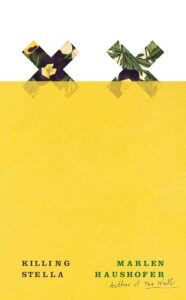
“A woman has been murdered. No one killed her. How can this be? In Marlen Haushofer’s novella Killing Stella, the world is full of un-murdered women who are nonetheless brought to death—either literally, like the titular Stella, or figuratively: by being so confined in their social roles that they’re dead on their feet.
Originally published in Austria in 1958 under the more damning title Wir töten Stella (We Kill Stella) and now vividly translated into English by Shaun Whiteside, the book asks whether a bystander is as guilty as a perpetrator—or whether that distinction holds at all. Sparse yet unsparing, it is a riveting, merciless fable of blame, shame, and consequence.
…
“A person can only hold so much contradiction before she self-destructs. For this reason, I can’t help but read Stella alongside Ingeborg Bachmann’s Malina (1971), whose last line famously reads: ‘it was murder.’ The victim here is the narrator herself, a woman who vanishes into a crack in the wall, having found no way to exist that is not defined in relation to men. Even resistance is co-opted and turned against her.
…
“In the Anglophone world, Haushofer is best known for her glorious, devastating The Wall (1963), also translated by Whiteside, about a nameless woman, akin to Anna, alone in the countryside and penned behind an invisible barrier—isolated yet liberated from precisely the type of ‘game’ Anna is ensnared by. That The Wall imagines the possibility of femme freedom through speculative fiction is all the more remarkable when compared to what could be read as its prequel, a book so grim and so suffocating and that feels so disturbingly real. Stella may have been a departure point for Haushofer, but it’s a total, self-encapsulating project—about a total, self-encapsulating doom.”
–Elvia Wilk on Marlen Haushofer’s Killing Stella (4Columns)


